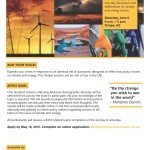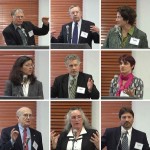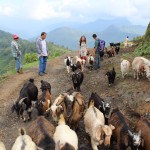Research Sustainability
In the final measure, sustainability asks whether the technological and institutional arrangements fashioned by human societies are consistent with the long-term thriving of both humanity and the natural environment. Cutting across all of our research areas, CSPO’s work focuses on the development of promising strategies for promoting sustainable outcomes: strategies for critically evaluating the evidentiary basis of sustainability research and policy, for imagining and envisioning more sustainable futures, for transforming socio-technological systems toward sustainable outcomes, and for engaging with stakeholders and harnessing diverse knowledge systems to foster processes of sustainable social and technological innovation and development.
-
Shared Principles for Community Collaboration in West Calcasieu Parish

Shared Principles for Community Collaboration (Shared Principles) is a community engagement process designed to help project developers and funders collaborate with community members on local energy projects. The Consortium for Science, Policy & Outcomes at Arizona State University (CSPO) is…
-
Carbon Dioxide Removal (CDR) Technology Public Forums and Application to Governance Frameworks

Current climate projections suggest that traditional sustainability efforts alone will not be sufficient for achieving the international community’s ambition of staying below a 2°C increase in global temperature in the coming decades; as such, utilizing drastic, novel approaches may also…
-
Climate Change Resilience: Governance and Reforms
Report authors: James Nachbaur, Irina Feygina, Elise Lipkowitz, and Darshan Karwat[1] January 30, 2017 Download the full report as a PDF here. Contents Overview Introduction Nine Ways to Apply a Governance Lens to Climate Change Resilience Communities and Local Governance…
-
Adaptation for a High-Energy Planet
In the winter of 2015, the world community agreed in Paris on a framework for lowering carbon emissions in the coming decades. This progress, though laudable, offers little comfort to the billions of people around the planet still vulnerable and…
-
Science Center Public Forums: Community Engagement for Environmental Literacy, Improved Resilience, and Decision-Making

Funded by the National Oceanic and Atmospheric Administration (NOAA) Office of Education (OED) and led by Arizona State University’s Consortium for Science, Policy & Outcomes (CSPO) and the Museum of Science Boston, this three year project will create a next-generation,…
-
World Wide Views on Climate and Energy

What is it? World Wide Views on Climate and Energy (WWViews on Climate and Energy) is a global citizen consultation, providing unique information about how far citizens around the world are willing to go, in order to deal with climate…
-
Our High-Energy Planet
In recent years, “energy poverty” has emerged as a central concept in international conversations on energy, climate, and development policy. While the term does not have one universally accepted definition, it is used by academics and development professionals as a…
-
High-Energy Innovation
Innovation in clean energy technologies is a truly global phenomenon, and the most active efforts to develop next-generation technologies are in rapidly industrializing countries, where energy demand is high and deployment opportunities are abundant. From advanced nuclear reactor technologies in…
-
Alternative Imaginations Research Cluster
Alternative Imaginations (AI) Research Cluster is an intellectual space that seeks to cultivate complementary perspectives on science and technology to address inequality, ecological harmony and sustainability. AI’s mission is to promote dialogue and understanding of alternative knowledge systems in assessing…
-
Science Policy Assessment and Research on Climate (SPARC)
Each day, in the face of deep uncertainty, millions of decisions are made that respond to and influence the behavior of climate. How does the nation’s multi-billion dollar investment in climate research affect those decisions? How can the societal value…
-
Sustainable Large-Scale Deployment of Perennial Biomass Crops
Project Duration: September 2012 – August 2017 The use of corn for ethanol production carries side effects, including food security concerns owing to its use as a staple food crop. Use of perennial feedstocks, such as miscanthus or switchgrass, offers…
-
Studies of Science, Technology, and Sustainability: Building a Research Agenda
In September, 2008, the National Science Foundation Program in Science, Technology, and Society sponsored a workshop organized by CSPO titled “Science, Technology & Sustainability: Building a Research Agenda.” The workshop brought together a diverse array of scholars working in the…
-
Partnership for Education on Climate Change, Engineered Systems, and Society

Project Period: September 2010 – August 2013 Principal Investigator: Rachelle Hollander, National Academy of Engineering Co-Principal Investigators: Clark Miller, CSPO Deborah Johnson, University of Virginia Juan Lucena, Colorado School of Mines Paul Fontaine, Museum of Science-Boston Overview This project is…
-
Knowledge Systems Project

Project Team: Clark Miller (CSPO) Tischa Munoz-Erickson (US Forest Service) Daniel Higgins (CSPO) Chad Monfreda (CSPO) Eric Kennedy (CSPO) Dave White (Decision Center for a Desert City) The dangers of misapplied knowledge have never been starker. Over the past half-century,…
-
Implementing Climate Pragmatism

Political gridlock, ineffective policies, and unmet emissions targets continue to hamper the global response to climate change. The agreement reached in Paris in 2015 marked a new level of commitment from the international community to slow global warming, but there…
-
Energy Innovation Systems From the Bottom Up: Technology Policies for Confronting Climate Change
About the project Energy Innovations Systems is a joint project of the Consortium for Science, Policy & Outcomes (CSPO) and the Clean Air Task Force (CATF), with support and cooperation from the Bipartisan Policy Center (BPC). Phase 1 began with…
-
Advancing Science Policy for Sustainability
Core to CSPO’s activities is the challenge of sustainability, of ensuring that the social and economic aspirations of the world are not compromised through destruction of the environment. Tens of billions of public dollars in the U.S. and in other…
-
Adaptive Pathways to Climate Change (APaCC): Livestock and Livelihood Systems in Gandaki River Basin

Integrated crop and livestock-based livelihoods of Nepalese farmers—characterized by small holding and low levels of development —are extremely sensitive to climate variability and change. Livestock is not only an important source of both draught power and animal protein, the latter…